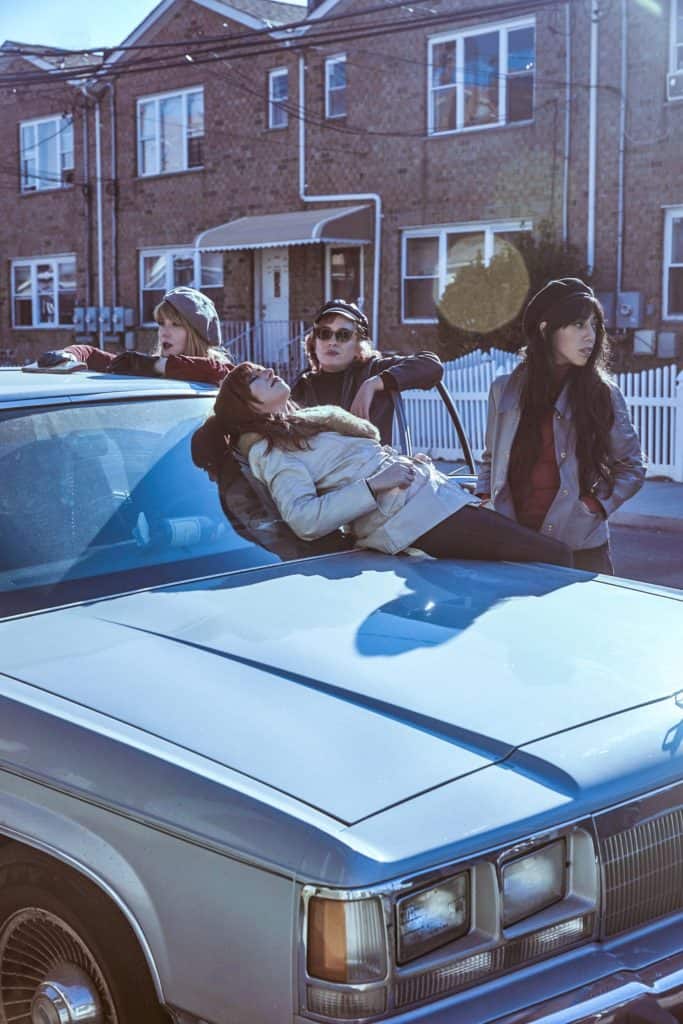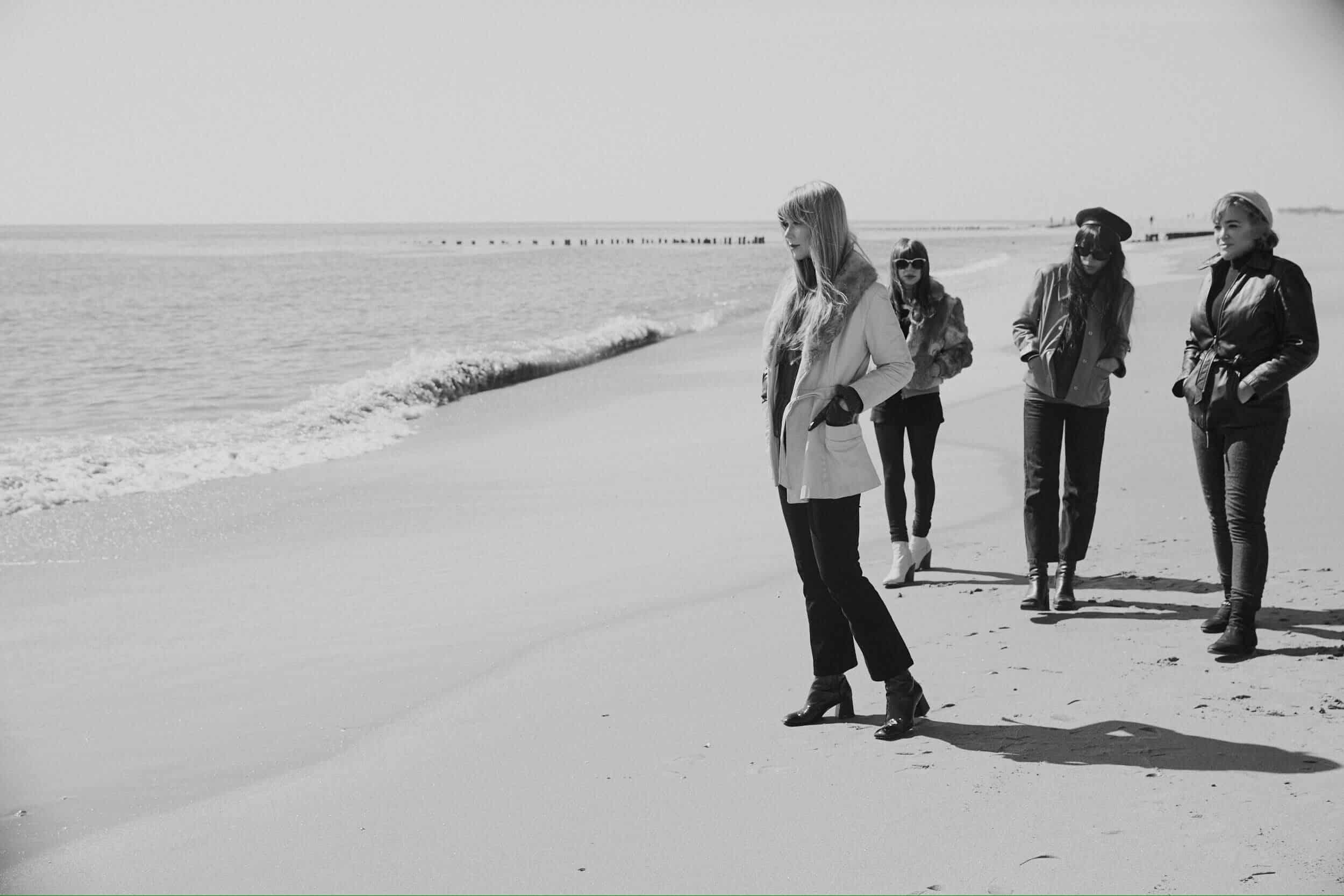Habibi is an all-female psychedelic Iranian-American rock band originally from Detroit, Michigan, now based in Brooklyn, New York. They’ve been featured on NPR, have previously released an EP and a full-length album, and will be playing a show with Ice Balloons at Market Hotel in Brooklyn on Saturday, February 15, at 9 pm to celebrate their second full-length release, titled Anywhere But Here, on Muddguts Records.
The group consists of Rahill, Lenny, Erin, Karen, and Leah on vocals, guitars, bass, and drums, respectively. Occasionally, they are joined live by other musicians, but the band is essentially a quintet. They cite bubblegum, comic books, Googoosh (an Iranian singer and actress), and Motown as major influences on their sound and style. The word Habibi is Arabic for “my love” and is a term of endearment for family and friends. It is with that spirit of positivity that the group takes its name.
Lead singer Rahill was inspired by the psychedelic sounds that swept the world in the 1960s and ‘70s and its particular imprint on the Iranian music scene. Her parents were born in Iran, immigrated to the USA, and she grew up in Detroit, Michigan. She sings in both Farsi, the native language of Iran, and English.
Rahill and Lenny met at a live show in Brooklyn, hit it off, and started making music shortly after. Rahill brought in Karen and Erin and soon they had a group. Rahill and Lenny both shared a love for global psychedelia, in particular Kourosh Yaghmaei, known as the “godfather of Iranian psychedelic rock,” whom Rahill grew up listening to, while Lenny also developed a love for world music from living in Detroit.
“Growing up in Michigan, I’d hear the daily Muslim call to prayer, which is so beautiful. I’m also into African, Thai, Turkish, and lesser known music. One thing these countries have in common is that they all loved the Beatles and tried to emulate those sounds with their particular rhythmic patterns. We also love looking for old records and have found some great re-releases on the Finders Keepers label,” says Lenny.
Regarding how the history of music and global pop culture influenced the vintage Iranian sounds that inspire them, Lenny says, “After the Iranian Revolution, people weren’t allowed to express themselves how they wanted. Artistic expression had to be nationalistic. But I think that caused artists like Kourosh to create more. With hardship and oppression comes expression. Like right now in our own country, there’s a booming art and music scene. Sometimes things have to get to rock bottom for people to know why it’s important to be creative and share it with the world.”
In terms of how the current tensions between the USA and Iran factors into Habibi’s music, Lenny says, “We just recorded a cover called ‘The World Ain’t Round, It’s Square,’ which speaks to how hippies were discriminated against. We give it a Middle Eastern treatment. I’m excited because we can all understand this kind of discrimination. Everything is being attacked on a global scale, which affects us all. It’s hard for us to imagine because we hobnob with all kinds of people every day in New York, but the title of the new album Anywhere But Here comments on this. It’s about feeling like you don’t belong anywhere and wanting to escape.”
About the songs, Lenny says, “The first tune I brought to Rahill was called ‘Come My Habibi’ but it was never put out. Now, I’m really excited that we’re putting it out on Anywhere But Here.”
Some of the album came from older recordings, with new tracks produced, engineered, and mixed by Alex Epton and Jay Heislemann. “We were finally able to record the songs in a way that did them justice because we feel more comfortable in our own shoes. We had also taken a break and played in other bands, so when we finally got back together, we had more clarity about what we wanted with Habibi. Sometimes in order to see a project clearly you have to take a step back from it,” says Lenny.
 As to how songwriting happens, Lenny explains, “Usually Rahill will come in with a melody or I’ll come in with some music, we’ll talk about it, and then work it out with the band. But there’s all different ways. Like with this album, one of my favorite songs is called ‘Stronghold.’ Leah helped us write the whole thing. Two songs that I used to play with my old band PMS, but were never recorded, appear on this album and are called ‘I Hate Everyone But You’ and ‘Born Too Late.’ Those have more of a garage tinge. They were fully fleshed, but we restructured them and Rahill added her touch with lyrics.”
As to how songwriting happens, Lenny explains, “Usually Rahill will come in with a melody or I’ll come in with some music, we’ll talk about it, and then work it out with the band. But there’s all different ways. Like with this album, one of my favorite songs is called ‘Stronghold.’ Leah helped us write the whole thing. Two songs that I used to play with my old band PMS, but were never recorded, appear on this album and are called ‘I Hate Everyone But You’ and ‘Born Too Late.’ Those have more of a garage tinge. They were fully fleshed, but we restructured them and Rahill added her touch with lyrics.”
Regarding the role of women in rock, Lenny states, “If you are a woman, you should have the freedom to continue in this business, which is really male-dominated.”
Lenny adds that female role models include Suzi Quattro of The Pleasure Seekers and Dolly Parton, “You can’t get better than that! Previously women had to sing songs that men wrote for us, but those women did it on their own. We’re lucky to be in this generation where we have a lot more freedom. The ‘Me Too’ movement has been helpful; people are a bit more aware of what they say and do.”
About building an audience and connecting with fans, Lenny says, “We have a lot of girls who come to our shows who sing along to our songs, which I love. We use Instagram for promo a lot, but it’s also important to talk to people afterwards. We need to do more videos, as things are becoming so much more visual.”
As for future plans, Lenny says that the band will release their version of “The World Ain’t Round, It’s Square,” focus on touring, and are already planning their next album. “Soundcheck is always a great time to come up with new material,” Lenny laughs.
Habibi’s music can be heard and purchased at https://habibitheband.bandcamp.com. Catch Habibi live Saturday, February 15th at 9pm with Ice Balloons at Market Hotel (1140 Myrtle Ave @ Broadway, Bushwick, Brooklyn – $15+, all ages).









